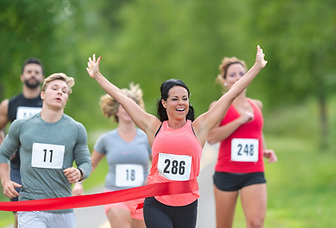🔥Die wichtigste deutsche Grammatik als PDF
Klar und kompakt - Für mehr Sicherheit beim Deutschlernen.

groß - big
positive

größer - bigger
comparative

am größten - the biggest
superlative
Adjectives: making comparisons
How to make comparisons in German.
The comparison of adjectives - what is it about?
Adjectives can be used for making comparisons.
In German, each adjective has three forms of comparison:
The basic form/ positive (groß - big), the comparative (größer - bigger) and the Superlative (am größten - the biggest).
The comparative compares two people or things and tells the difference.

Die Dampflokomotive ist schnell, aber der ICE ist schneller.
The steam engine is fast , but the ICE is faster .
The superlative compares at least three or more things/ people or a set of things/ people. It denotes the "highest" level.
Das Flugzeug ist am schnellsten - The plane is the fastest .

Brief overview:

How do I form the comparative?
In the comparative, the adjective always has the ending -er .
If the adjective comes before a noun in the comparative, it gets an adjective ending .
Das Auto ist schneller - das schnellere Auto
To compare two things you need the word " als " next to the comparative:
Das Flugzeug ist schnneller als das Auto.
Special case: comparative without "e"
Some words lose one 'e' in the comparative form:
1. If the adjective ends in -er and there is a vowel before -er then the "e" is dropped in the comparative:
-
teuer - teurer - am teuersten
-
sauer - saurer- am sauersten
If there is no vowel before the -er, the "e" remains:
-
sauber - sauberer - am sauersten
-
lecker - leckerer - am leckersten
2. If the adjectives ends in -el, the "e" is dropped in the comparative:
-
dunkel - dunkler - am dunkelsten
-
edel - edler - am edelsten
How do you form the superlative?
The superlative is formed with the ending -ste or -sten .
That depends on what comes before the adjective.
1. "am" + adjective + -(e)sten
-
Alle laufen schnell. Aber Anna läuft am schnellsten.
-
Wir jubeln laut. Max jubelt am lautesten.

2. mit bestimmtem Artikel + -(e)ste
-
Sie ist die schnellste Frau.
Der Artikel zeigt dann den Genus des Nomens an:
-
der schönste Kuchen.
-
die leichteste Aufgabe.
-
das netteste Kind.
The superlative with an additional "e"
When adjectives end in -d, -ß, -sch, -t, -tz, -x or -z, the (e) helps with pronunciation.
-
wild - Dieses Pferd ist am wildesten. Es ist das wildeste Pferd
-
süß - Der Beeren von Oma sind am süßesten. Sie hat die süßesten Beeren.
-
hübsch - Das Kleid finde ich am hübschesten. Es ist das hübscheste Kleid, das ich habe!
-
alt - Diese Kirche ist am ältesten. Das ist die älteste Kirche der Stadt.
-
spitz - Welcher Pfeil ist am spitzesten? Ich brauche den spitzesten Pfeil.
-
fix - Lena ist sehr schnell - sie ist am fixesten von allen! Sie ist das fixeste Kind, das ich kenne!
-
kurz - Im Winter sind die Tage am kürzesten. Es sind die kürzesten Tage des Jahres.
Genauso:
blind, blöd, dicht, echt, fest, fett, feucht, fies, glatt, hart, heiß, laut, leicht, leise, mies, mild, müde, nett, sanft, satt, schlecht, spät, stolz, weise, zart ...
The adjective "groß" is an exception:
groß - größer - am größten
Umlauts in the comparative and superlative forms
Most short words with a, o or u take an Umlaut in the comparative and superlative forms:
a ä, o ö, u ü
-
alt - älter - am ältesten
-
groß - größer - am größten
-
jung - jünger - am jüngsten
The same way: arm, dumm, gesund, hart, kalt, klug, krank, kurz, lang, rot, scharf, stark, schwach, warm

How to compare irregular adjectives
These adjectives are irregular:


Anna hat viel Geld.
Peter hat mehr Geld.
Lena hat am meisten Geld. / Sie hat das meiste Geld.
Can you compare adverbs?
Adverbs usually cannot be compared:
More than "here" is not possible - one cannot be "herer".
But there are some exceptions:

Ich freue mich sehr, wenn die Sonne scheint.
Ich freue mich (noch) mehr, wenn die Sonne scheint und es warm ist.
Und ich freue mich am meisten, wenn ich dann Urlaub habe!
Summary:
The most important information about the comparison of German adjectives
-
You need the comparative and superlative forms of adjectives when you want to compare something.
-
The adjective has a positive form, a comparative form and the superlative form.
-
The comparative is formed by adding the ending -er to the adjective
-
The superlative is formed by adding the ending -ste(n) to the adjective.
-
It is very similar to the English nice, nicer the nicest - pattern. But is is even easier to learn as this pattern also applies to long adjectives (when you have to use more/most in English):
English: interesting - more interesting - most intersting
German: interessant - interessanter - am interessantesten
Do you want to learn German?
I'm Charlotte, a native German speaker and certified German teacher. I help German learners from all over the world to speak German confidently and fluently.
More than 250,000 students worldwide have learned German or improved their language skills with me: In private lessons, group courses, on Instagram and through my popular weekly podcast "Uplevel Your German".
Let’s achieve your language goal together!

%2013_12_21.png)
